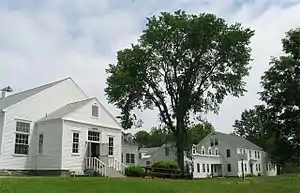Marlboro College
Marlboro College was a private liberal arts college in Marlboro, Vermont. It closed at the end of the 2019–2020 academic year and gifted its endowment to Emerson College in Boston to create the Marlboro Institute of Liberal Arts and Interdisciplinary Studies at Emerson College.
 | |
| Type | Private |
|---|---|
| Active | 1946–2020 |
| Endowment | $40 million (2014) |
| President | Kevin F. F. Quigley, |
Administrative staff | 41 full-time faculty |
| Students | 150 |
| Location | , , United States |
| Campus | Rural: 360 acres (1.5 km2) |
| Website | www |
Students at Marlboro created an individualized course of study in collaboration with faculty members and participated in a self-governed community. Students pursued a self-designed, often inter-disciplinary thesis, the Plan of Concentration, based on their academic interests that culminated in a major body of scholarship. Students were able to use the college's organic farm, solar greenhouse, ecological reserve, and observatory. Weekly "town meetings" were held to vote for and change the college's bylaws.
History
Marlboro College was founded in 1946 by Walter Hendricks on Potash Hill in Marlboro, Vermont, and many of the first students were returning World War II veterans.[1] The school's operation was initially financed using money received from the GI Bill, as well as loans from Brattleboro Savings and Loan. The campus incorporates the buildings of three old farms that once operated on the college site, along with more modern buildings. Marlboro has grown steadily since its inception, and 150 students currently attend, with an average enrollment of 250 students. The College, however, is kept "intentionally small."
In 1997 Marlboro College founded the Marlboro College Graduate School to apply the same educational principles of Marlboro College to advance the careers of working professionals. The Graduate School also offers an accelerated Master's track to undergraduates in select programs.[2] While the Graduate School was initially located in nearby Brattleboro, it moved to the main college campus in Marlboro in April 2017.[3]
The Marlboro College campus has also been the summer home for more than 50 years to the Marlboro Music Festival.
In 2018, Marlboro's small size and dwindling enrollment led it to begin exploring merging with another college or university. Discussions advanced with the University of Bridgeport but were called off in September 2019 as negotiations continued.[4] Two months later, the college announced plans to merge with Emerson College in Boston. As per the agreement, Marlboro would give its endowment to Emerson where all Marlboro students will be admitted and tenure-track faculty will be able to choose to teach at Emerson. The deal was finalized by the Board of Trustees of Marlboro and Emerson Colleges on July 23, 2020.[5] Marlboro closed its campus at the end of the 2019–2020 academic year,[6] and the college ceased operations on August 15, 2020.
Campus
Location
The Marlboro College campus was located on South Road in the town of Marlboro, Vermont, in the Green Mountains. Marlboro was just off Route 9, which runs east–west across southern Vermont, ten miles from Brattleboro to the east with Wilmington and Bennington further to the west. Boston is two and a half hours to the east, Burlington is two and a half hours to the north, Hartford, CT is one and a half hours to the south, and New York City is four hours to the south.
The closest major town is Brattleboro, and students frequently made the 20-minute drive along Route 9 to hang out there at night and on weekends. The similar but much larger Amherst–Northampton area of western Massachusetts, easily accessible via Interstate 91, was also a favorite hangout.
Facilities

Marlboro's facilities were relatively small because of its enrollment numbers. Many of the buildings—including the main classroom building, the dining hall, the admissions building and the administration building—are converted farm buildings that predated the college. Students and faculty worked together to convert these historic buildings for use by the college.[7] Through grants from federal, state and private entities, the college improved the energy-efficiency of the Dining Hall, Dalrymple classroom building, Mather administration building, and the Admissions building since 2008, as well as the student residences. In the summer of 2011, the half-circle driveway at the campus entrance was converted to green space and walking paths.

The Serkin Performing Arts Center has a 125-seat auditorium, an electronic music lab, practice rooms with baby grand pianos and a 5,000-square foot dance studio. Whittemore Theater is another performing arts space which is used primarily by the Theater department. Attached to Whittemore theater is Drury Gallery, a gallery space often used by fine arts students to display their works, although students from other departments have also used the space to showcase their work.
The Snyder Center for the Visual Arts, a $3.5-million dollar, 14,000-square-foot visual arts center that houses studios, classrooms, and gallery spaces, opened in May 2016.[8]
Academics
Marlboro was 1 of only 3 national liberal arts colleges in which 100% of its classes have fewer than 20 students.[9] Three quarters of Marlboro College alumni attend graduate school.[10]
The Clear Writing Requirement
Freshman students usually took one or more classes designed to boost their writing skills to an acceptable undergraduate level. All freshmen were required to submit 20 pages (4,000 words) of nonfiction writing to the English Committee by the end of their second semester. If the committee decided that a student's writing skills needed more work, they recommended a class to help, and the student would prepare another portfolio, at least 10 pages of which must be new, at the end of the next semester for re-evaluation. In the event that a student failed the writing requirement for three consecutive semesters, the school will ask the student to leave with the caveat that they can return after receiving high marks from an English class at another school. However, virtually all students passed the writing requirement within two semesters.[11]
The Plan of Concentration
Juniors and seniors focused on developing an individualized Plan of Concentration rather than on heavy coursework. "Plan" was a large, self-designed project often involving a combination of disciplines. Juniors and seniors focused on independent work and increasingly take tutorial classes where the student collaborates closely with a faculty member to design an individualized syllabus. For most students Plan culminates in a written thesis, although art and science students may demonstrate work through other projects. All Plans were required to include a written portion constituting at least 20 percent of the total plan work. In addition, all Plans were required to include an independent project prepared without direct faculty input, also constituting at least 20 percent of the total plan. Plans that consisted entirely of academic writing usually ranged from one hundred to two hundred pages, double-spaced.
The results of this work were defended in an oral examination before two Marlboro professors, and one outside evaluator who has expertise in the student's field of study but was not connected with the college. The presence of the outside evaluator was meant to ensure that the grading process is fair and objective. The final plan was then put on permanent file as a reference work in the college library.[12]
Academic honors
Loren Pope, original author of the Colleges that Change Lives college guide and former education editor for The New York Times, writes about Marlboro, "You will find the Marlboro adventure far more intense and intellectually demanding than Harvard, any other Ivy, or Ivy clone. There simply is no comparison."[13]
Marlboro College received a perfect academics rating of 99 and was also ranked #1 nationally for its quality of professors ("Professors Get High Marks") in The Princeton Review's 2014 annual college guide.[14]
Beautiful Minds Challenge
Since 2012 the college has offered the Beautiful Minds Challenge, an essay contest for high school students that rewards winners with 12 full or partial scholarships and other prizes. Essays may take the form of text, images, audio, or video. Submissions are judged by Marlboro faculty, staff, and students. Finalists are flown to the Marlboro campus for a Symposium where they present their work.[15] The Beautiful Minds Challenge was discontinued after the 2018 competition.
People
Notable faculty
- Wyn Cooper taught at Marlboro.
- Jay Craven taught film at Marlboro
- Paul J. LeBlanc served as Marlboro's president from 1996 to 2003 (currently president of Southern New Hampshire University).
- Peter Lefcourt taught literature and writing from 1968–1970 (novelist David Rhodes was one of his students)
- Leslie Lamport taught at Marlboro in the late-1960s
- David Mamet taught at Marlboro for one semester
- Joseph Mazur taught mathematics at Marlboro
- Blanche Honegger Moyse taught music at Marlboro
- Louis Moyse taught music at Marlboro
Notable alumni
- David Asman, television journalist
- Shura Baryshnikov, dancer
- Deni Ellis Béchard, novelist
- Sophie Cabot Black, poet
- Regina Lee Blaszczyk, academic
- Sara Coffey, member of the Vermont House of Representatives
- Sean Cole, journalist
- Alicia Dana, Paralympian
- Marcus DeSieno, lens-based artist
- Deborah Eisenberg, author (left after two years)
- Ed Fallon, member of the Iowa House of Representatives
- Daniel Harple, entrepreneur and investor
- Parnell Hall, novelist
- Joshua Harmon, poet, novelist, and essayist
- Emilie Kornheiser, member of the Vermont House of Representatives
- Ted Levine, actor
- Robert H. MacArthur, ecologist
- Cate Marvin, poet
- Jonathan Maslow, journalist and author
- Chris Noth, actor
- David Rhodes, novelist
- Hans Rickheit, cartoonist (left after one year)
- Eneriko Seruma, poet and novelist
- Jock Sturges, portrait photographer
- Missy Suicide (left after one year)
- Matthew Temple, actor and filmmaker
- Tristan Toleno, member of the Vermont House of Representatives
- Charlotte Watts, mathematician, epidemiologist, and academic
Notable staff
- Robert Frost, poet, one of the college's first trustee[16]
- Ethan Gilsdorf, author, worked in the marketing department in the late-1990s
Student life
Open mic nights at the Campus Center happened several times a semester in addition to events like the Drag Ball, MayFest, Apple Days, and other events. During the Spring and Fall, students were encouraged to "plant, weed, landscape, and harvest on a regular basis" on the school farm. Once a semester, a campuswide Work Day, in the spirit of the original class that built their own dormitories, encouraged students, staff, and faculty to maintain campus through various projects that change depending on the needs of the campus. "Midnight Breakfast" was an event celebrated each semester the eve before writing portfolios are due.
The school was founded on and continues to encourage a tradition of community participation and values. A weekly "town meeting" allowed all community members to gather and vote to change the college bylaws. An elected community court dispensed justice when necessary. Different elected committees, consisting of students, faculty and staff, helped to hire faculty (or even college presidents) and steer the curriculum, among many other responsibilities.
The library was also open all night and used a self-checkout honor system to keep track of borrowed materials. All buildings, academic and residential, were open 24/7 to allow students to access materials and workspaces at their discretion.
Athletics were also shaped by Marlboro's location, and by Vermont's long winters – the coldest weather coincides with the academic year. Though few organized sports teams existed, the school's "Outdoor Program" promoted activities such as rock climbing, snowshoeing, cross-country skiing, white-water kayaking, caving, canoeing, hiking, and the annual February broomball tournament, a collegiate tradition maintained since 1998. In addition, the College was just 15 miles from the Mount Snow ski resort.
Student publications
Editors-in-chief of the College's different magazines were elected during town meetings. The administration of the school published a biannual magazine, Potash Hill. A student newspaper, The Citizen, was published monthly on campus. "Articles in The Citizen vary from serious editorials to tongue-in-cheek campus news, from oblique photo-essays to “Horrorscopes” like “Sagittarius: Money from strangers can be expected. Red is your color. Watch where you put your thumb.”[17]
See also
- List of colleges and universities in Vermont
- Deep Springs College
References
- "History". Marlboro College. Marlboro College. Retrieved 30 July 2019.
- "Marlboro Launches Accelerated Master's Track". Marlboro College website.
- "Marlboro College consolidates campuses". Brattleboro Reformer. April 2, 2017.
- Flaherty, Colleen (September 16, 2019). "No Deal". Inside Higher Ed. Retrieved November 6, 2019.
- "What's Next for Marlboro". Marlboro.edu. 2020-07-23. Retrieved 2020-09-10.
- Jaschik, Scott (November 6, 2019). "Emerson Plans to Absorb Marlboro". Inside Higher Ed. Retrieved November 6, 2019.
- "OUR HISTORY". Marlboro College website.
- "Community Dedicates Visual Arts Center". Marlboro College website. May 2016.
- "Marlboro Continues to Rise in U.S. News Ranking". Marlboro College website.
- "Alumni Survey Substantiates Positive Image". www.marlboro.edu. 2012. Retrieved 3 February 2017.
- Marlboro College. "Clear Writing Program". nook.marlboro.edu. Marlboro College. Retrieved 26 June 2014.
- Marlboro College. "PLAN OF CONCENTRATION". marlboro.edu. Marlboro College. Retrieved 26 June 2014.
- Pope, Loren. Colleges That Change Lives, 3rd edition, 2006, p. 10.
- "Marlboro College professors ranked #1 nationally by Princeton Review". vtdigger.org. 7 August 2013.
- "Marlboro launches 2017 Beautiful Minds Challenge". Marlboro College website.
- "MARLBORO COLLEGE THROUGH THE YEARS". Marlboro College website.
- "Student Publications - Marlboro College". www.marlboro.edu.